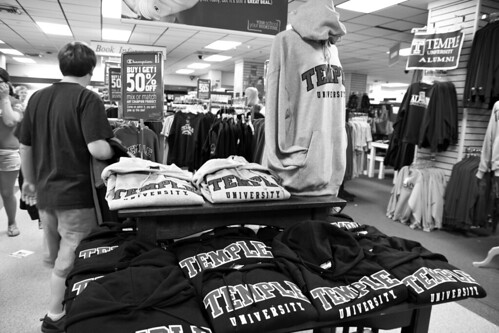A new politically friendly clothing company began production of Temple apparel.

Anthony Santangelo grinned widely with embarrassment as his mother told him to try on a larger-sized sweatshirt.
“Mom, I think it fits,” the sophomore undeclared major said. They both peeked in a mirror inside the Main Campus Barnes & Noble College Bookseller, scanning the item’s color scheme, fit and eventually, price tag.
The hooded sweatshirt Santangelo donned sells for $34.98 and is one of the bookstore’s least expensive. But before Santangelo ever held it, laborers from Alta Gracia Apparel manufactured the piece.
Approximately 125 of the laborers work in a Dominican Republic factory. They are also a part of a union and are paid three times the country’s minimum wage.
“This can be a way out of poverty,” said Joe Bozich, the CEO of Knights Apparel, the sponsoring company. “This can truly be life changing. Doing good is doing good business.”
Bozich said Alta Gracia, which translates to “exalted grace,” is making a “historic breakthrough” in the clothing-making businesses, touting the company as the first in the world to have marketed an apparel product based on responsible labor practices.
“We’re pricing the product right, so that it won’t burden the retailer or consumer,” he said.
Most clothing sold in the United States is first sewn and stitched in factories based in poverty-stricken cities in China, India or small Central American countries. Many of these clothing companies strip its workers of rights, pay a minimum wage that will never permit its workers a decent living and trap generations of workers into a cycle of sweatshop labor, according to Knights Apparel public relations.
“Finally these workers have jobs that allow them to escape from poverty,” said Teresa Cheng, the international campaign coordinator of United Students Against Sweatshops.
“When you’re talking about making sure the factory isn’t a sweatshop, you’re talking about making sure there’s not underage children,” said Joel Friedman, vice president of general merchandising and store construction/design for Barnes & Noble College Booksellers. “You’re talking about women’s rights are protected especially when child-bearing. You’re making sure hours are controlled, wages are being paid, breaks are given.”
Most of the apparel that Barnes & Noble College Booksellers offers on its 637 campuses nationwide is produced from about a dozen clothing manufacturers.
Friedman said Barnes & Noble refuses to do business that’s not a part of the Fair Labor Association and mandates companies to sign a code of conduct to prove they do not support sweatshops.
Alta Gracia is “absolutely a historic movement,” Friedman said, largely because, for the first time ever, a clothing company allows a union, pays a livable wage and fosters sweatshop-free factories.
Santa Castillo, one of its workers, will now be able to afford materials to build a new home four times larger than the one-bedroom shack that she, her husband and three children share.
Alta Gracia kick-started in college bookstores two weeks ago and sold 600 items its first week, totaling $11,000 of sales, Bozich said.
Professor and Chair of the economics department William Stull said charging people more for a product they can get for less can be profitable, but usually relies on “making buyers feel good about themselves for buying the product, or to impress their peers with a brand name.”
“How much extra are people willing to pay for a garment not produced by a sweatshop?” he said. “This is a market that allows for some exploration, but I don’t think this is a high-profit strategy due to entry barriers and depending its brand on the credibility of non-sweatshops.”
But the company already boasts the credibility of the Worker Rights Consortium, a labor-rights watchdog for more than 175 U.S. colleges and universities.
“By committing to pay a living wage, they’ve done something that no brand has done before,” Director of Communication Theresa Haas said.
The WRC has verified its Dominican Republic factory, finding that the $2.38 an hour that Alta Gracia pays its workers is 340 percent above minimum wage. That’s significantly higher than the 85 cents many Chinese factories pay its workers or the 15 cents an hour that Bangladesh pays, according to the New York Times.
Although sales have been modest its first week, the company is depending on consumers embracing its corporate social responsibility to build its brand.
With such a large range of customers, however, reaching every niche might be difficult. College bookseller’s large customer base includes students, parents, alumni and staff. But when Santangelo chose his sweatshirt, he liked it simply because, “It looked cool.”
Matthew Petrillo can be reached at matthew.petrillo@temple.edu.



Be the first to comment